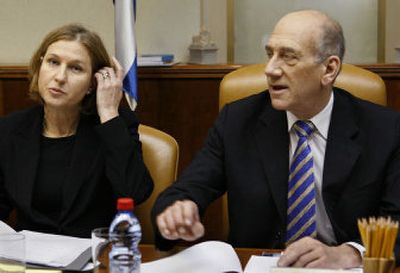Israeli leader survives resignation calls

JERUSALEM – Prime Minister Ehud Olmert appeared to face down a revolt within his party Wednesday over his decision to remain in office after an investigative committee found “serious failings” in his management of the Lebanon war last summer.
The most prominent former ally to call for his resignation was Foreign Minister Tzipi Livni, who is next in line for his job. Speaking at a news conference here after meeting with Olmert, Livni said she told the prime minister that “resignation is the right option.”
But Livni, who also serves as deputy prime minister, said she would remain in Olmert’s Cabinet and oppose any effort in parliament to topple his government. Doing so would trigger new elections, and opinion polls show that their Kadima party has lost significant public support since winning a plurality in the March 2006 vote.
“This is a decision that he must make,” said Livni, who disclosed that she would run for the party leadership. “I believe Kadima must remain and lead the state of Israel.”
Livni’s statement, which brought calls from some Kadima lawmakers that she be fired, highlighted the dilemma facing the governing party as it contends with the sharp criticism leveled against Olmert by the Winograd Commission on Monday.
Kadima lawmakers, who joined the party at its creation in November 2005 from across the ideological spectrum, have an interest in seeing Olmert remain in office or turn the job over to one of their own rather than collapse his governing coalition.
Livni largely escaped criticism from the commission, which recommended that the Foreign Ministry be given more say during future conflicts. In calling on Olmert to resign, she said that “general elections would be a mistake” because “Israel needs stability.”
A majority of Kadima’s 29-member parliamentary bloc appears to be backing Olmert, whose aides worked through the day to shore up support.
The head of Kadima’s parliamentary faction, Avigdor Itzchaky, warned early in the day that he would demand Olmert’s resignation “in order for Kadima to return to being a legitimate ruling party.” But only a small fraction of the bloc eventually called on Olmert to step down, aware that opinion polls show Kadima and its largest coalition partner, Labor, trailing the hawkish Likud and Israel Is Our Home parties.
When Olmert declined, Itzchaky resigned as faction leader.
Olmert appointed the five-member investigative panel, headed by retired judge Eliyahu Winograd, last September to examine Israel’s performance in a 33-day war that failed to achieve its stated goals and exposed the country’s north to repeated rocket barrages.
In its interim findings, the committee said the prime minister acted “hastily” in going to war with Hezbollah, the Lebanese Shiite Muslim movement, after its gunmen crossed Israel’s border July 12 and captured two Israeli soldiers. Israeli officials say they believe Hezbollah is still holding them.
The panel concluded that Olmert, who had never held a security post, failed to ask for a detailed military plan to secure the soldiers’ release. It also said Israel’s army was “not ready for this war,” casting blame on Defense Minister Amir Peretz and the chief of staff, Lt. Gen. Dan Halutz, who has since resigned.